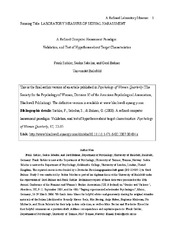A refined computer harassment paradigm: Validation, and test of hypotheses about target characteristics
Permanent lenke
https://hdl.handle.net/10037/2022Dato
2008Type
Journal articleTidsskriftartikkel
Peer reviewed
Sammendrag
A refined computer paradigm for assessing sexual harassment is presented, validated, and used for testing substantive hypotheses. Male participants were given an opportunity to send sexist jokes to a computer-simulated female chat partner. In Study 1 (N = 44), the harassment measure (number of sexist jokes sent) correlated positively with self-reported harassment proclivity. Study 2 (N = 77) included a more elaborate cover story, variations of the female target’s attitude (feminist vs. traditional) and physical attractiveness (low vs. high), and additional measures for construct validation. Results showed that harassment correlated positively with self-reported harassment proclivity, hostile sexism, and male identity. Feminist targets were harassed more than traditional targets, whereas target attractiveness had no effect. Theoretical and applied implications are discussed.
Beskrivelse
This is the final author version, post refereeing, of the article.


 English
English norsk
norsk